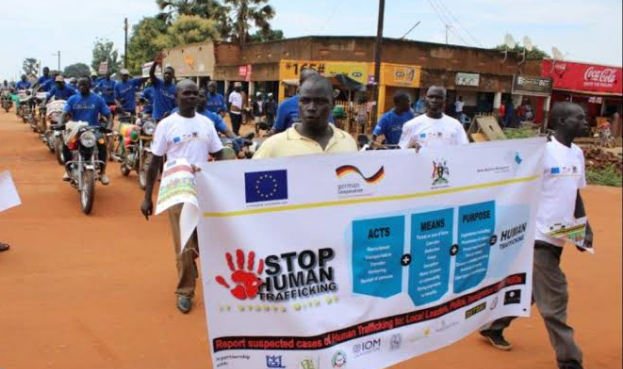Uganda has on Sunday, July 30, 2023, joined the rest of the world to celebrate World Day against trafficking in persons.
World Day Against Trafficking in Persons is observed on July 30 every year to raise awareness about the trends in human trafficking identified by the United Nations Office on Drugs and Crime (UNODC). It also aims to put pressure on governments, law enforcement agencies and civil society to strengthen the prevention of trafficking and the identification and support of victims.
According to Joycelynn Karungi, the International Organization for Migration’s National Programme Officer, the theme for this year’s celebrations has been, “Reach Every Trafficking Victim,Leave No One Behind,” and majority of the victims are women and children. Besides, these victims suffer violence, sexual abuse, forced labour, among others.
“International Organization for Migration (IOM) launched the national trafficking data base. It is also a tool that helps to track all cases that are reported.The data base tool will also cut across the country. It is a government laid process, and it will help in curbing the trafficking cases.The IOM Victim of Trafficking Database (VoTD) is the largest database on human trafficking worldwide. This database is actively used across all IOM regional and country missions as a standardized anti-trafficking case-management tool,” Karungi said.
While explaining the seriousness of the problem, UN noted, “Trafficking in persons is a serious crime and a grave violation of human rights. Every year, thousands of men, women and children fall into the hands of traffickers, in their own countries and abroad. Almost every country in the world is affected by trafficking, whether as a country of origin, transit or destination for victims.”
History:
World Day Against Trafficking in Persons was adopted at a high-level meeting of the United Nations General Assembly through Resolution A/RES/68/192. The resolution reaffirms the commitment of the United Nations to end trafficking in persons, especially women and children. It also states that, trafficking in persons is a serious threat to human dignity and physical integrity, human rights and development.
Significance:
Global crises, conflicts and climate emergencies have increased the risk of trafficking. People who don’t have legal status, live in poverty, have limited access to education and health care, face discrimination, abuse/ violence, and come from marginalized communities and are particularly vulnerable to trafficking.
In fact, the Covid-19 pandemic has also changed the nature of trafficking by driving it underground and increasing the risk to victims as the crimes are less likely to come to the attention of authorities.
According to UNODC, the criminal justice response to trafficking has slowed, with detection rates dropping by 11 percent and conviction rates dropping by 27 percent in recent years.















